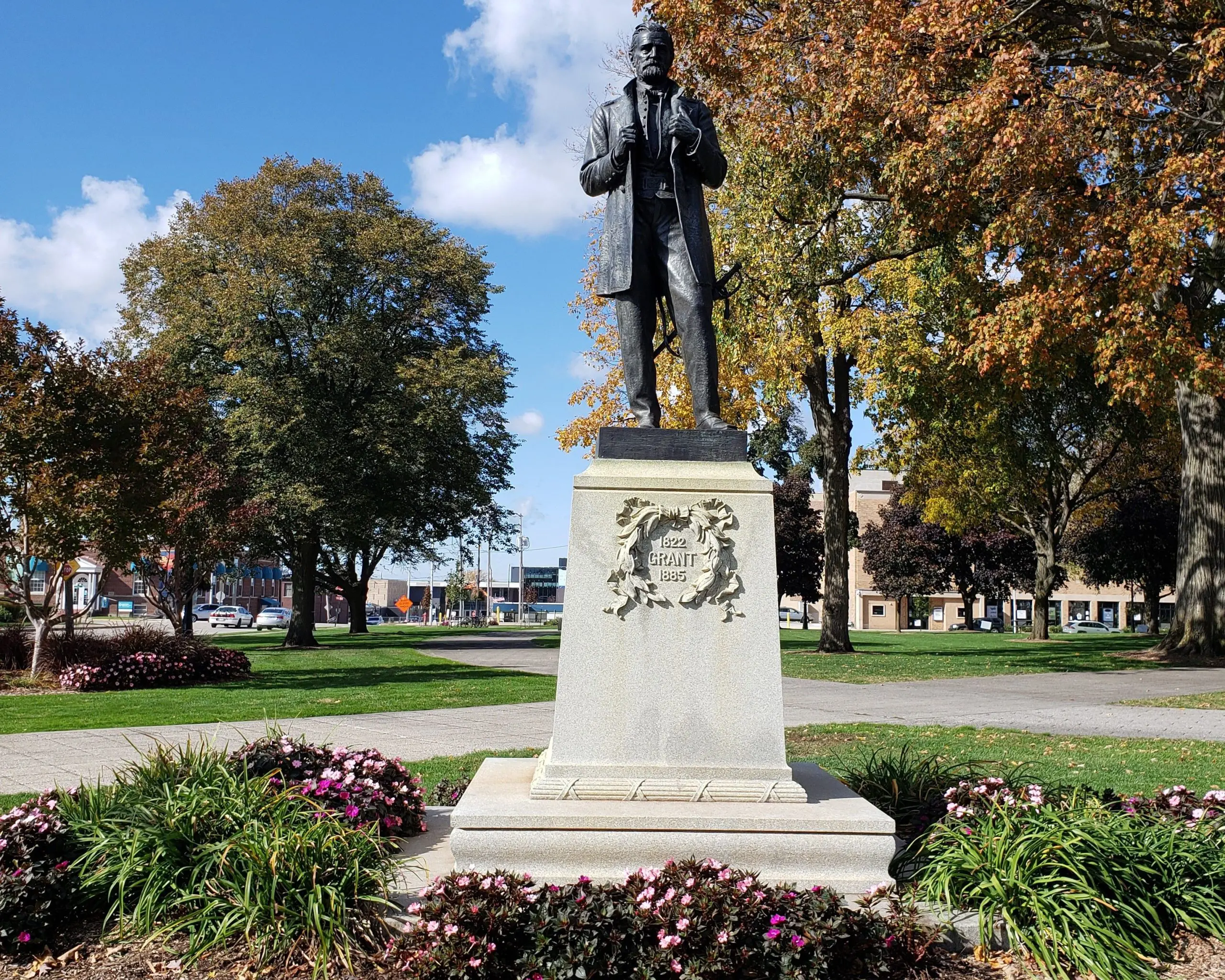Living here we all know that Michigan winters can be brutal. Even in recent history, we had the polar vortex of 2019. As I sit here writing, we are expecting a generational storm this Christmas. As a history teacher, I know that former president Ulysses S. Grant lived in Michigan for three years and had to deal with these snowy winters. He disliked them so much that when a neighbor failed to keep his sidewalk clean, Grant took him to court.
Grant’s Early Years
Before we get into that specific story, a little background on Grant’s life should be reviewed. He is best known for defeating the Confederacy and bringing the American Civil War to a close, as well as being the 18th president of the United States.
He was born Hiram Ullyses Grant in Point Pleasant, Ohio on April 27, 1822, and attended a variety of schools. In his youth, he developed an uncommon ability to manage and ride horses. Though leery of his academic abilities, with his father’s insistence, Congressman Thomas Hamer nominated him to West Point Military Academy. Grant was mistakenly nominated under the name Ulysses Simpson (his mother’s maiden name). Grant, unable to change the records, eventually accepted it as his own. To his friends, he was simply known as Sam. Grant was indifferent to military life and didn’t excel at West Point, with the exception of anything to do with horses. He did manage to graduate 21st out of 39 students in the class on June 30, 1843.
Mexican-American War
After graduating, Grant only planned on serving his required four years in the military. Despite being gifted with horses; he was assigned to the infantry. His first assignment as in St. Louis. This is where he was introduced to his future wife, Julia Dent. She was the sister of his close friend and roommate at West Point, Frederick Dent. Ulysses and Julia became secretly engaged, but before their wedding could occur, the Mexican-American War broke out. Grant didn’t personally agree with the war, but still fought to the best of his ability. He made a name for himself during the conflict and was brevetted for bravery. Among his many other duties in Mexico, he worked as an assistant quartermaster. This became instrumental in his life, as it allowed him to understand multiple aspects of the military that would later aid him during the Civil War.
Move to Michigan
Upon returning home, Grant finally married Julia, on August 22, 1848. His first post-war assignment was to Detroit in April of that year. He rented a home that he described in a letter to Julia as “…the lower part of the home there is a neat double parlor, a dining room, one small bedroom, and kitchen, there is a nice upstairs and a garden filled with the best kind of fruit.” Julia joined Ulysses in Detroit after the wedding, and they continued to live in the “sweet, pretty house” as it was characterized by Julia.
The two-story Greek-Revival house on Fort Street had been built in 1836. The two settled into the home nicely and quickly became active in Detroit society. They attended parties, dances, and dinners, and were quite well-known and liked. Julia became pregnant with her first son in Detroit but she traveled to St Louis to be with her family for the delivery. Ulysses was known as a trustworthy and honorable figure and a man of conviction and nerve.
Grant V Beaubien
Not much is known about the Grants’ time in Michigan, though one story stands out. In early January of 1851, Ulysses was walking along Jefferson street near his home and slipped and fell on the ice, something that has happened to probably everyone who has ever lived in Michigan. Instead of simply brushing himself off and going on with his day, Grant decided to take things a step further.
On January 10, he signed a deposition claiming that Antoine Beaubien Jr. had neglected to keep his sidewalk cleared of ice and snow and was responsible for Grant’s fall. Grant also charged Detroit Mayor Zachariah Chandler, who also lived on Jefferson, with street negligence. The case went to trial by jury, and the jury ruled in favor of the future president. Chandler was fined 6 cents. This event must not have damaged the relationship between the two men too badly, as Chandler would later be appointed Secretary of the Interior by Grant in 1875.
The Detroit home the Grants lived in has been moved a few times and spent time as a museum. In 2020, it was moved one more time and is now located at the corner of Orleans and Wilkins, awaiting a new purpose.
The Civil War
In 1851, Grant was transferred from Detroit to the Pacific Northwest, but Julia was unable to travel with him. Grant disliked being separated from his family, and many consider this as being one of the reasons he resigned from the army. So it was that in 1854, he entered civilian life. Grant tried and failed in many different occupations over the next few years, but the outbreak of the Civil War pulled him back into the military.
He spent much of the war in the Western theater. His successes drew the attention of President and Commander-in-Chief, Abraham Lincoln, who promoted him to the commander of the Union army in 1864. Grant is credited with bringing the war to an end. In 1868, he was nominated for president, and, though he didn’t play much of a role in the campaign, he defeated Horatio Seymor. He was reelected in 1872 and won easily. Unfortunately, his presidency was rife with scandals, most notably financial scandals among members of his party and administration. Despite his poor administration, Grant accomplished some positive actions that included prosecuting Ku Klux Klan members, supporting African American Civil Rights, and pursuing a positive relationship with Native American tribes.
Life as a Former President
After leaving the White House, he went on a world tour that included dinner with Queen Victoria. He later moved to New York. He attempted other business ventures but was again unsuccessful. Grant began writing his memoirs to publish as a way of avoiding poverty. He died on July 23, 1885, at the age of 63, from throat cancer. He was a popular figure in his time, and is memorialized as a symbol of national unity,
Yes, as I sit here in my warm cozy study, daydreaming and staring out the window at the gently falling white snowflakes, I think of Hiram Ulysses Simpson Grant. Despite only spending a few years in Michigan he certainly can teach us a lesson and I am not in reference to his perseverance. I am, in fact, in reference to the lesson that he has taught us in regard to keeping our sidewalks free of snow and ice, so I’m off to bundle myself up in my coat and mittens to shovel my own sidewalks. Stay warm and safe!







Leave A Comment
You must be logged in to post a comment.